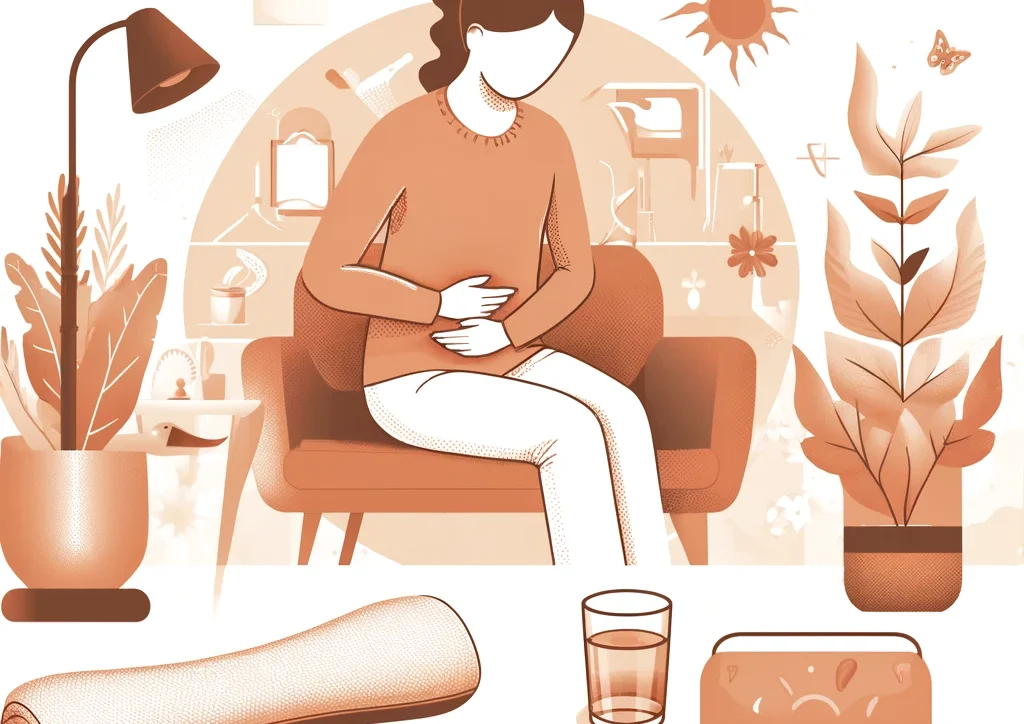Hey daar! We zijn Verloskundigen PuurBegin en we begrijpen dat menstruatieproblemen een lastig onderwerp kunnen zijn waar je misschien niet dagelijks over spreekt. Toch heeft bijna iedereen met een baarmoeder hier op een bepaald moment mee te maken. Of je nu worstelt met onregelmatige cycli, hevige bloedingen, krampen die je dag verstoren, of je gewoon meer wilt weten over wat er precies gebeurt tijdens je menstruatiecyclus, wij staan voor je klaar met informatie en tips die echt helpen.
In dit artikel duiken we diep in de wereld van menstruatieproblemen. We vertellen je wat normaal is, wat minder normaal kan zijn en wanneer het tijd is om misschien professionele hulp te zoeken. Ook delen we enkele handige tips om de dagen ’van de maand’ wat comfortabeler door te komen. Laten we samen deze taboes doorbreken en zorgen voor een gezonde, geïnformeerde benadering van jouw menstruatiecyclussen. Lees je mee?
Wat zijn menstruatieproblemen en hoe herken je ze
Menstruatieproblemen kunnen zeer divers zijn en variëren van milde ongemakken tot ernstige aandoeningen die je dagelijkse leven beïnvloeden. Het is belangrijk om te weten welke symptomen kunnen wijzen op mogelijke problemen. Pijn is een veelvoorkomend symptoom; dit kan variëren van lichte krampen tot hevige pijn die moeilijk te negeren is. Andere signalen zijn onder meer zeer zware bloedingen of juist zeer lichte bloedingen, onregelmatige cycli of het uitblijven van de menstruatie zonder dat er een duidelijke reden zoals zwangerschap is.
Bovendien kunnen emotionele symptomen zoals plotselinge stemmingswisselingen of extreme vermoeidheid ook indicaties zijn van menstruatieproblemen. Let dus naast de fysieke klachten ook op psychische veranderingen. Onderstaande tabel geeft een overzicht van de meest voorkomende menstruatieproblemen en hun symptomen, waardoor je snel en effectief kunt handelen als je deze herkent.
| Probleem | Symptomen |
|---|---|
| Menorragie | Hevig bloedverlies |
| Amenorroe | Uitblijven van menstruatie |
| Dysmenorroe | Ernstige pijn tijdens menstruatie |
| PMS (premenstrueel syndroom) | Stemmingswisselingen, vermoeidheid, hoofdpijn |
Als je een of meer van deze symptomen ervaart, is het een goed idee om dit met je huisarts of een gynaecoloog te bespreken. Vroegtijdige herkenning en behandeling kunnen niet alleen de symptomen verlichten maar ook voorkomen dat de problemen verergeren. Onthoud, je hoeft niet stil te lijden—hulp zoeken is een belangrijke stap naar een gezonder leven. Blijf niet rondlopen met vragen over je menstruatie, wij van Verloskundigen PuurBegin zijn hier om je te ondersteunen en adviseren.
Verschillende soorten menstruatieklachten uitgelicht
Menstruatie kan gepaard gaan met verscheidene klachten, die variëren van mild tot zeer storend. Menstruatiepijn is wellicht de bekendste klacht. Deze pijn manifesteert zich vaak als krampen in de onderbuik, die soms uitstralen naar de onderrug of benen. Daarnaast kan ook hoofdpijn optreden, vaak als gevolg van hormonale schommelingen tijdens de cyclus.
Verder ervaren veel vrouwen tijdens hun menstruatie stemmingswisselingen, die eveneens toe te wijzen zijn aan hormonen. Dit kan leiden tot irritatie en zelfs depressieve gevoelens. Daarnaast is hevig bloedverlies (menorragie) een klacht die het dagelijkse leven flink kan beïnvloeden. Hieronder volgt een lijst met praktische tips voor het omgaan met deze klachten:
-
- Gebruik een warmtekussen voor verlichting van buikkrampen.
-
- Zorg voor voldoende beweging, dit kan helpen om krampen te reduceren.
-
- Eet ijzerrijke voeding om bloedarmoede door hevig bloedverlies tegen te gaan.
Diverse symptomen kunnen ook wijzen op specifiekere aandoeningen zoals endometriose of PCOS (Polycysteus-ovariumsyndroom). Let op signalen zoals extreem pijnlijke menstruaties en onregelmatige cycli en aarzel niet om deze met je huisarts of gynaecoloog te bespreken. Voor gedetailleerde informatie kun je altijd terecht bij ons als Verloskundigen PuurBegin - wij bieden een luisterend oor en professioneel advies voor alle types menstruatieproblemen.
Hoe voeding en levensstijl je menstruatie kunnen beïnvloeden
Vaak realiseren we ons niet hoeveel invloed onze dagelijkse gewoonten hebben op onze gezondheid. Voeding en levensstijl spelen echter een cruciale rol, zeker als het gaat om de menstruatiecyclus. Door bepaalde voedingsmiddelen te eten, kun je bijvoorbeeld de pijn verminderen en de regelmaat van je cyclus bevorderen. Zo is het bekend dat voedsel rijk aan omega-3 vetzuren, zoals zalm en walnoten, helpt tegen ontstekingen, wat weer kan leiden tot minder krampen. Anderzijds kunnen transvetten en cafeïne juist menstruatiepijn verergeren.
Verder is het essentieel om aandacht te besteden aan je fysieke activiteit. Regelmatige beweging, zoals yoga of licht cardio, kan niet alleen de menstruatiepijn verminderen, maar ook helpen om je hormoonhuishouding in balans te houden. Bovendien, door stressmanagement technieken zoals meditatie of diepe ademhalingsoefeningen te integreren in je dagelijkse routine, kun je de impact van stress op je menstruatie minimaliseren. Onderstaande tabel geeft een eenvoudig overzicht van do’s en don’ts met betrekking tot voeding en levensstijl die de menstruatie kunnen beïnvloeden:
| Vermijden | Aanbevelen |
|---|---|
| Transvetten | Omega-3 vetzuren |
| Cafeïne | Magnesiumrijke voeding |
| Hoge stress | Regelmatige lichte beweging |
Uiteindelijk is elke vrouw uniek, dus luister goed naar je lichaam en probeer verschillende methoden uit om te zien wat het beste werkt. Onthoud dat kleine aanpassingen in je levensstijl al een groot verschil kunnen maken voor je welzijn tijdens je menstruatie.
Praktische tips voor het omgaan met menstruatiepijn
Vervelende krampen en pijn tijdens je menstruatie kunnen je dag behoorlijk verstoren. Gelukkig zijn er verschillende methoden die verlichting kunnen bieden. Ten eerste, warmte is jouw vriend. Het gebruik van een warmtekussen of -kruik op je onderbuik kan de doorbloeding stimuleren en daarmee de pijn verzachten. Daarnaast kunnen lichte oefeningen zoals yoga of een korte wandeling ook helpen om de pijn te verminderen.
Naast fysieke remedies, zijn er ook verschillende voedingsadviezen die kunnen helpen. Zorg ervoor dat je genoeg water drinkt; hydratatie kan krampen verminderen. Ook is het aangetoond dat het verminderen van cafeïne en zout tijdens je menstruatie symptomen zoals opgeblazenheid en krampen kan verminderen. Tot slot, bekijk de mogelijkheid van magnesiumsupplementen. Magnesium staat bekend om zijn spierontspannende eigenschappen, wat handig kan zijn voor die vervelende krampen. Hieronder staat een tabel met voedingsmiddelen die rijk zijn aan magnesium:
| Voedsel | Magnesiumgehalte |
|---|---|
| Spinazie (gekookt) | 157 mg per portie |
| Pompoenzaden | 168 mg per 28 gram |
| Zwarte bonen | 120 mg per kop |
Al met al, het belangrijkste is om goed naar je lichaam te luisteren en verschillende methodes te proberen tot je vindt wat voor jou het beste werkt. En onthoud, als de pijn ondraaglijk is of als je zorgen hebt over je menstruatiepatroon, aarzel niet om contact op te nemen met je huisarts of gynaecoloog. Elk lichaam is anders en soms is professionele hulp de sleutel tot verbetering.
Wanneer moet je naar de dokter met je menstruatieproblemen
Het is belangrijk om te weten wanneer menstruatieproblemen een teken zijn dat je naar de dokter moet. Soms kunnen deze problemen een onderliggende gezondheidskwestie signaleren. Je moet beslist overwegen om professionele hulp te zoeken als je één van de volgende symptomen ervaart:
-
- Hinderlijk hevige of juist heel lichte bloedingen: Als je maandverband of tampon elk uur moet verwisselen of als je menstruatie opvallend licht is en dat ongebruikelijk voor je is.
-
- Pijn die je dagelijkse activiteiten belemmert: Menstruatiekrampen zijn normaal, maar als de pijn zo ernstig is dat het je dagelijks leven beïnvloedt, kan dit een teken zijn van aandoeningen zoals endometriose of fibromen.
Bovendien, als je cyclus heel onregelmatig is of als je menstruaties plotseling stoppen (en je bent niet zwanger), is het verstandig om dit te bespreken met een arts. Ook als er sprake is van symptomen zoals ernstige vermoeidheid of ongewoon zware emotionele reacties tijdens je cyclus, kan dit wijzen op hormonale onevenwichtigheden. Hier een eenvoudig overzicht wanneer een bezoek aan de dokter aan te raden is:
| Symptoom | Advies |
|---|---|
| Hevige bloeding | Bezoek arts binnen enkele dagen |
| Zeer lichte bloeding | Discuteer tijdens reguliere controle |
| Ernstige pijn | Maak z.s.m. een afspraak |
| Onregelmatige cyclus | Bezoek arts voor evaluatie |
Laten we vooral niet vergeten dat ons lichaam signalen afgeeft die we niet moeten negeren. Een regelmatig bezoek aan de huisarts of een specialist kan veel voorkomende problemen op tijd aan het licht brengen. Wees dus alert op wat je lichaam je probeert te vertellen en neem het zekere voor het onzekere door tijdig medisch advies in te winnen.
Samenvatting
We hopen dat je deze uitgebreide gids over menstruatieproblemen nuttig hebt gevonden. Onthoud dat je niet alleen bent; veel vrouwen kampen met vergelijkbare uitdagingen. We moedigen je aan om open te zijn over je ervaringen en niet te aarzelen om hulp en advies te zoeken. Bij Verloskundigen PuurBegin staan we altijd voor je klaar om ondersteuning te bieden en je vragen te beantwoorden. Neem gerust contact met ons op als je meer informatie wenst of een afspraak wilt maken. Onthoud: je gezondheid is belangrijk en wij zijn hier om je te begeleiden bij elke stap. Tot slot, zorg goed voor jezelf en blijf op de hoogte van alles wat met je gezondheid te maken heeft.
Blijf op de hoogte!
Volg ons op social media voor het laatste nieuws en een kijkje achter de schermen bij Verloskundigen PuurBegin in Kampen.
Ontdek de dagelijkse avonturen van onze verloskundigen, waardevolle tips voor aanstaande ouders en inspirerende verhalen uit de praktijk.
Klik op de onderstaande knoppen en blijf verbonden met ons hartverwarmende team!
 |
 |
Hartelijke groet,
Verloskundigen PuurBegin
Adres: Orkestlaan 148, 8265RC Kampen
Telefoon: 085 40 19 095








